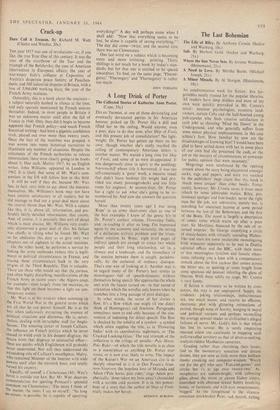Crack-up
Dare Call it Treason. By Richard M. Watt. (Chatto and Windus, 30s.) TRE,year 1917 was one of revolutions—or, if you like, the true Year One of this century. It was the year of the overthrow of the Tsar and the triumph of the Bolsheviks; the year of American intervention in European affairs; the year of war-weary Italy's collapse at Caporetto; of Austria's desperate peace feelers; of Passchen- daele, and 588 industrial disputes in Britain, with a loss of 5,966,000 working days; the year of the French Army mutinies.
Ostensibly, this is a book about the mutinies— a subject naturally hushed in silence at the time, and only' sparsely mentioned by French sources thereafter. Indeed, to most people in Britain it was an unknown matter until after the fall of France in 1940. Only then did it begin to become apparent that French policy—and much French historical writing—had been a gigantic confidence trick, played out over more than twenty years. Once the fact of the mutinies was grasped, it was woven into many historical narratives to illuminate any number of situations. Despite the reluctance of the French -authorities to release information, there were clearly going to be books about it. One such, Mutiny 1917, by an English writer, John Williams, appeared in London in 1962. It is likely that some of Mr. Watt's com- patriots in the US will follow him in this field.
It will be well if they do, because Mr. Watt has, in fact, very little to say about the mutinies themselves. Mr. Williams's book may not have been entirely satisfactory to all readers, but he did manage to find out a great deal more about the central theme than Mr. Watt. With a subject like this, it is, above all, information, and pre- ferably fairly detailed information, that counts. And, of course, it is precisely that sort of detail which is most elusive.. Mr. Williams very credit- ably disinterred a great deal of this; his failure was chiefly in sifting what he found. Mr. Watt so far abdicates this duty as to give only two chapters out of eighteen to the actual mutinies.
On the other hand, he performs a service by linking the army outbreaks (where this is legiti- mate) to political circumstances in France, and tracing those circumstances back to the very origins of the Third Republic. This is valuable. There are those who would say that the,curious, and often highly disturbing, manifestations of the French Army in recent years—the Algiers coup, for example—stem largely from the mutinies, so that this light on them becomes a light on con- temporary events.
Mr. Watt is at his weakest when summing up the First World War in the general terms which are all that he can permit himself. He is at his best when judiciously extracting the essence of Political situations and dilemmas. He is, never- theless, dealing with intractable stuff for Anglo- Saxons. The amazing career of Joseph Caillaux, the influence on French politics which he never ceased to wield even in his deepest disgrace, his return from that disgrace to ministetial office— these are quirks which Englishmen will probably never understand. Nor will they understand the astonishing role of Caillaux's mouthpiece, Malvy, Who remained Minister of the Interior with wide Powers until after the eleventh hour, and nearly ruined his country.
Equally, of course, 'a Clemenceau (Mr. Watt's hero) k outside our ken. But Mr., Watt deserves commendation for quoting Poincare's splendid comment on Clemenceau : 'The more I think of the matter, the more 1 ;ay to myself : -So long 'as victory is possible. he is capable of upsetting
everything!" A day will perhaps come when I shall add: "Now that everything seems to be lost, he alone is capable of saving everything."' The day did come—twice; and the second time there was no Clemenceau.
One last word on a subject which is becoming more and more irritating: printing. Thirty shillings is not much for a book by today's stan- dards, but for that one is entitled to be spared absurdities. To find, on the same page, 'Ybarne- garay,"Ybarnegary' and 'Ybarnegaray' is rather too much.
JOHN TERRAINE






































 Previous page
Previous page